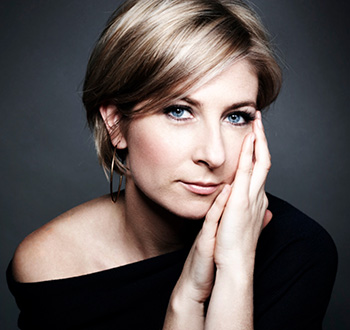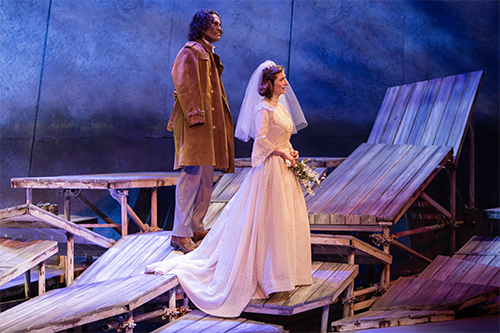by Daniel Hathaway

In a telephone conversation from South Bend, Indiana, where she teaches at the University of Notre Dame, Duffy said, “Coming to Cleveland seems like a homecoming, because some of the most important gigs of my early professional career were there doing early music.”
Those gigs were with Apollo’s Fire, including performances and a recording of Handel’s Dixit Dominus over a decade ago, and more recently, the Praetorius Christmas Vespers. Since that time, Duffy has expanded her musical universe to include new music as well.
“Early music and new music make a strange pair of bedfellows, but they often go hand in hand in people’s careers. Obviously I’ve sung a really broad range of repertoire over mine. When I went to Westminster Choir College, where I earned two degrees, I planned on being a choral conductor, so I was really immersed in early repertoire,” she said. “New music was a totally unexpected discovery for me that started at Tanglewood in 2006 when I sang in Elliott Carter’s opera. That was a trial by fire — my first legit new music project.”
Duffy describes those polar experiences as a love affair that has lasted ever since and allows her a great deal of freedom. “It feels as though there aren’t as many hard and fast rules in both. You can chart your own course. Doing the canonic music of the later 18th and 19th centuries seems like wearing a straitjacket — at least for me.”
The soprano blames that feeling on the abundance of recordings of the core repertoire. “I found it overwhelming and kind of suffocating to have to live up to Callas et al. Singing the very early repertoire and the very new, there’s not an expectation of what that repertoire should sound like. In Baroque music, you have such freedom in terms of interpolations and ornamentation. You can customize a piece to the kind of unique things that you do.”
Some of Duffy’s most memorable moments have involved first performances, like Missy Mazzoli’s Breaking the Waves with Opera Philadelphia in 2016. “Premieres are thrilling, exhilarating, and scary,” she said. “Dare I say that was probably the most special project of my professional career. I was involved with the opera for two years, and I workshopped all three acts. Missy really wrote the role of Bess McNeill for me — that was my first experience where someone tailor-made a role for my voice. It was like wearing a bespoke suit — a real luxury.”

Quick notes come fast and furious in the third movement, and Duffy is training for Mozart’s melismas with the concentration of an athlete. “I’ve got my metronome out and I’m pushing myself to see how far I can go and still be precise. I don’t think I can beat 124, but I’m working my way up.”
Unlike many concert artists, Kiera Duffy juggles a full-time professorship and a solo career. As the head of undergraduate voice studies at Notre Dame, she teaches a dozen private students and a classroom course and handles such administrative duties as recruitment, expansion, and development.
“I love, love, love teaching, and I’m working assiduously to balance that with performing,” she said. “It’s a dynamic situation. I took the job before Breaking the Waves had its premiere and people looked at me cross-eyed when I said I was going to be teaching full-time in the spring semester.”
It’s not as though she had been actively courting an academic position. “This job sort of fell into my lap. I feel ridiculously fortunate. But I had a small child and I knew from the get-go that I wasn’t going to be the kind of performer who could gallivant all over the world with a 2-year-old in tow. Notre Dame has been incredibly supportive of the performance side. What’s great about having this job is that it’s given me the luxury of being choosy with the work that I want to do. And frankly, some of the most interesting projects are not the most remunerative.”
Duffy is taking things relatively easy this spring. “I had such a crazy last semester — teaching a new course, making my debut with the Berlin Philharmonic singing the Schoenberg Second String Quartet, going to New York for an Orfeo, then doing a premiere at Ojai turned out to be a little bit too much. I’m only singing in Cleveland this semester. In the summer I’m doing a chamber music festival of French fin-de-siécle music in Maryland started by a violinist colleague with players from Chamber Music at Lincoln Center, and members of the MET orchestra.
“Next season, I’ll be singing the New York premiere of a new opera by Ricky Ian Gordon at the Prototype Festival, then I’ll perform with Boston Baroque in Handel’s Ariodante — again traversing those poles from the old to the new.”
Will Kiera Duffy be bringing her now 3-year-old son along with her to Cleveland? “Heck no!” she said, laughing. “I’m going to enjoy my time at the Ritz-Carlton all by myself. But it’ll be a working vacation for sure.”
Duffy will sing with The Cleveland Orchestra in four concerts this weekend at Severance Hall: Thursday, February 14 at 7:30 pm, Friday, February 15 at 7:00 pm, Saturday, February 16 at 8:00 pm, and Sunday, February 17 at 3:00 pm. Also on the all-Mozart program: the Fantasia for a musical clock, K. 608, and the “Prague” Symphony, No. 38.
Published on ClevelandClassical.com February 11, 2019.
Click here for a printable copy of this article



